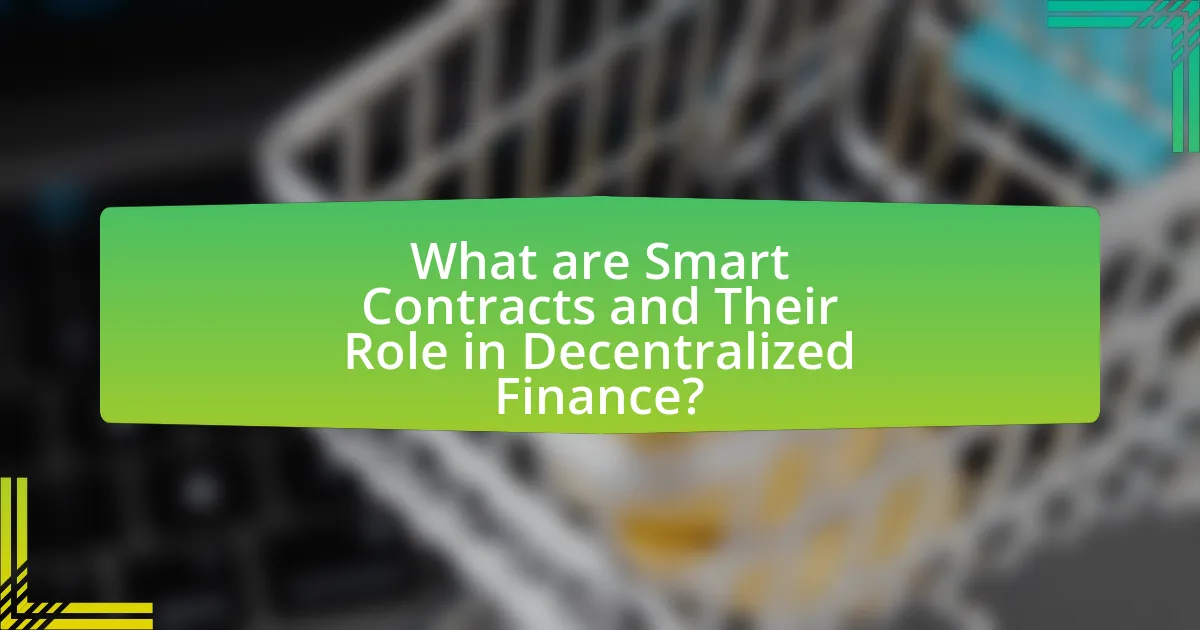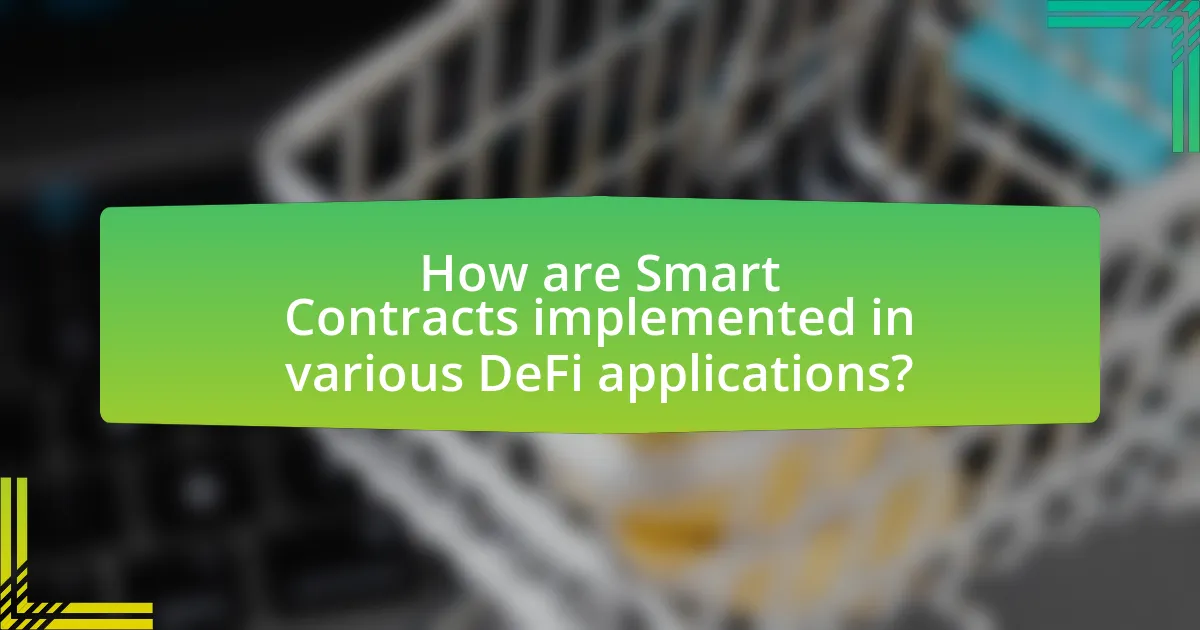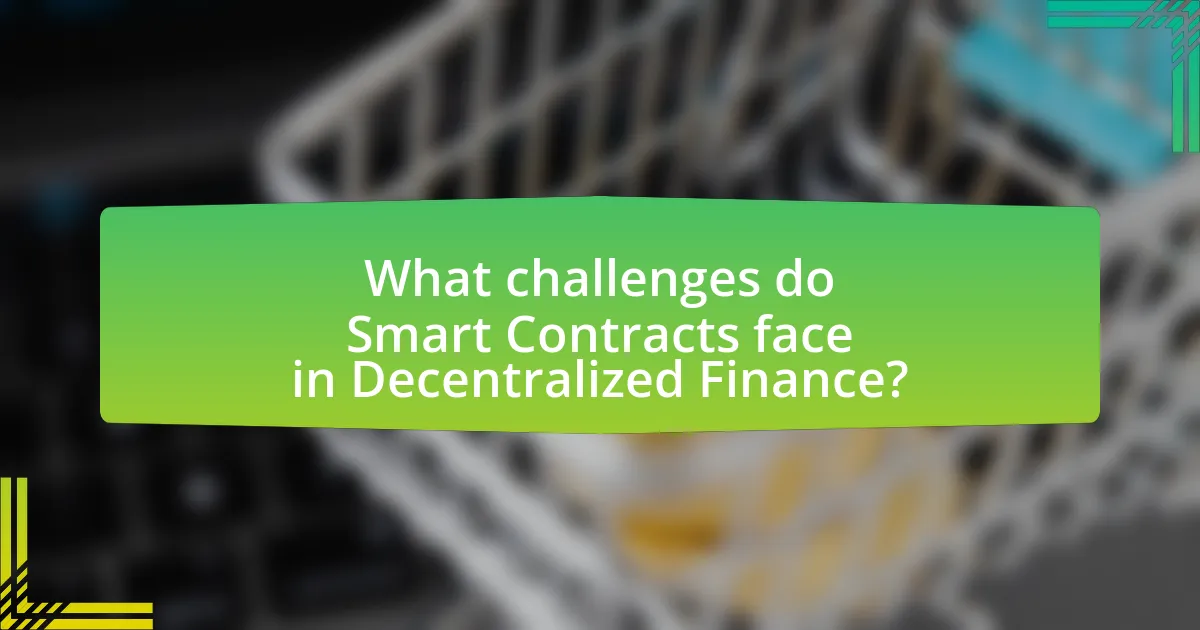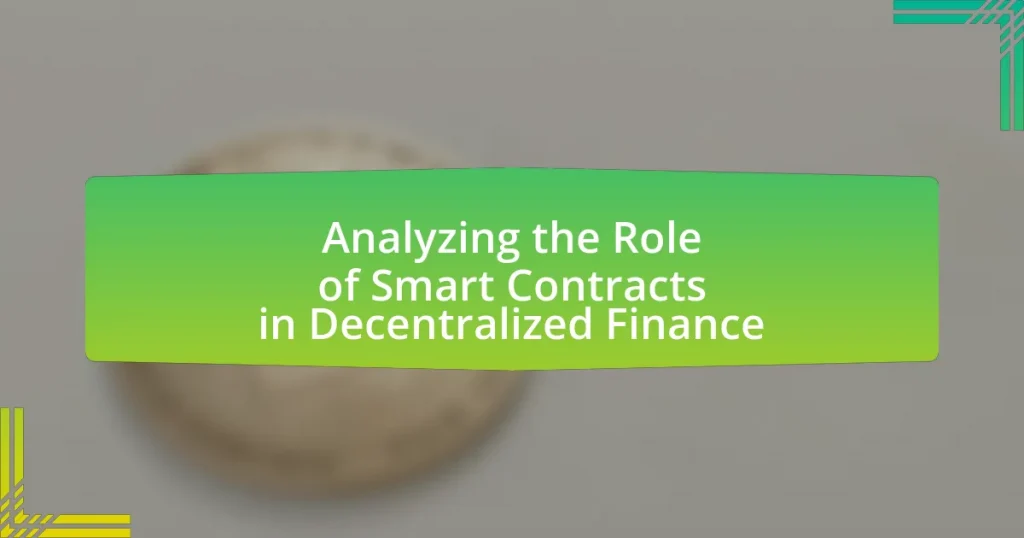Smart contracts are self-executing agreements coded on blockchain technology, playing a crucial role in decentralized finance (DeFi) by automating and enforcing financial transactions without intermediaries. This article analyzes how smart contracts enhance efficiency, transparency, and security in DeFi applications, such as lending, borrowing, and trading. It explores the key components of smart contracts, their advantages, risks, and the challenges they face, including security vulnerabilities and regulatory compliance. Additionally, the article discusses best practices for developing secure smart contracts and the tools available for developers in the DeFi ecosystem.

What are Smart Contracts and Their Role in Decentralized Finance?
Smart contracts are self-executing contracts with the terms of the agreement directly written into code, operating on blockchain technology. In decentralized finance (DeFi), smart contracts facilitate, verify, and enforce financial transactions without intermediaries, enhancing efficiency and reducing costs. For instance, Ethereum, a leading blockchain platform, enables developers to create decentralized applications (dApps) that utilize smart contracts for various financial services, such as lending, borrowing, and trading. This automation and transparency provided by smart contracts in DeFi contribute to a more accessible and secure financial ecosystem, as evidenced by the rapid growth of DeFi platforms, which collectively hold billions in assets and have revolutionized traditional financial practices.
How do Smart Contracts function within Decentralized Finance?
Smart contracts function within decentralized finance (DeFi) by automating and enforcing agreements without intermediaries. These self-executing contracts are coded on blockchain platforms, primarily Ethereum, allowing for trustless transactions and interactions among users. For instance, smart contracts facilitate lending, borrowing, and trading by executing predefined conditions, such as transferring assets when certain criteria are met. This automation reduces the need for traditional financial institutions, lowers transaction costs, and enhances efficiency. According to a report by the World Economic Forum, smart contracts could potentially save the financial services industry up to $400 billion annually by streamlining processes and reducing fraud.
What are the key components of Smart Contracts in this context?
The key components of Smart Contracts in the context of Decentralized Finance (DeFi) include code, execution environment, and blockchain integration. Smart Contracts are self-executing contracts with the terms of the agreement directly written into code, which ensures automated and trustless transactions. The execution environment, typically a blockchain platform like Ethereum, provides the necessary infrastructure for these contracts to operate securely and transparently. Blockchain integration is crucial as it allows Smart Contracts to leverage decentralized consensus mechanisms, ensuring that all parties can verify the contract’s execution without relying on a central authority. These components collectively enable the functionality and reliability of Smart Contracts within the DeFi ecosystem.
How do Smart Contracts ensure trust and transparency in transactions?
Smart contracts ensure trust and transparency in transactions by automating and enforcing agreements through code on a blockchain. This automation eliminates the need for intermediaries, reducing the risk of fraud and manipulation. The decentralized nature of blockchain technology means that all participants can independently verify the terms and execution of the contract, ensuring that the agreed-upon conditions are met without reliance on a central authority. Additionally, once deployed, smart contracts are immutable, meaning they cannot be altered, which further enhances trust among parties involved. The transparency of transaction records on the blockchain allows all stakeholders to audit and confirm the contract’s execution, reinforcing accountability and trust in the process.
What advantages do Smart Contracts provide in Decentralized Finance?
Smart contracts provide automation, transparency, and security in decentralized finance (DeFi). Automation allows for self-executing agreements without intermediaries, reducing transaction times and costs. Transparency ensures that all parties can verify contract terms and transactions on the blockchain, fostering trust. Security is enhanced through cryptographic techniques, minimizing the risk of fraud and unauthorized access. According to a report by the World Economic Forum, smart contracts can potentially save the financial services industry up to $100 billion annually by streamlining processes and reducing operational costs.
How do Smart Contracts reduce costs and increase efficiency?
Smart contracts reduce costs and increase efficiency by automating and streamlining transactions without the need for intermediaries. This automation minimizes human error and eliminates the fees associated with traditional transaction processes, such as legal and administrative costs. For instance, a study by the World Economic Forum estimates that smart contracts could save businesses up to $3 trillion annually by 2030 through enhanced operational efficiencies and reduced transaction costs. Additionally, smart contracts execute automatically when predefined conditions are met, which accelerates transaction times and enhances trust among parties, further contributing to overall efficiency in decentralized finance.
What risks are mitigated by using Smart Contracts in financial transactions?
Smart contracts mitigate several risks in financial transactions, including counterparty risk, fraud, and operational inefficiencies. By automating contract execution through code, smart contracts eliminate the need for intermediaries, reducing the likelihood of default by ensuring that terms are executed as programmed. Additionally, the transparency and immutability of blockchain technology help prevent fraudulent activities, as all transaction records are publicly verifiable and cannot be altered. According to a report by the World Economic Forum, smart contracts can significantly decrease transaction costs and processing times, further minimizing operational risks associated with traditional financial systems.

How are Smart Contracts implemented in various DeFi applications?
Smart contracts are implemented in various DeFi applications by automating financial transactions and processes on blockchain networks, primarily Ethereum. These self-executing contracts facilitate functions such as lending, borrowing, trading, and yield farming without the need for intermediaries. For instance, in lending platforms like Aave, smart contracts manage collateral, interest rates, and loan agreements automatically, ensuring transparency and security. Similarly, decentralized exchanges like Uniswap utilize smart contracts to execute trades directly between users, relying on liquidity pools governed by these contracts. The implementation of smart contracts in DeFi enhances efficiency, reduces costs, and minimizes the risk of fraud, as all transactions are recorded on a public ledger, providing verifiable proof of actions taken.
What types of DeFi applications utilize Smart Contracts?
Decentralized Finance (DeFi) applications that utilize smart contracts include decentralized exchanges (DEXs), lending platforms, yield farming protocols, and stablecoins. DEXs like Uniswap and SushiSwap use smart contracts to facilitate peer-to-peer trading without intermediaries, ensuring transparency and security. Lending platforms such as Aave and Compound leverage smart contracts to automate the borrowing and lending process, allowing users to earn interest on their assets. Yield farming protocols, including Yearn.finance, utilize smart contracts to optimize returns on investments by automatically reallocating funds across various liquidity pools. Stablecoins like DAI and USDC rely on smart contracts to maintain their peg to fiat currencies, ensuring stability in value. These applications demonstrate the versatility and efficiency of smart contracts in automating complex financial transactions within the DeFi ecosystem.
How do Automated Market Makers (AMMs) leverage Smart Contracts?
Automated Market Makers (AMMs) leverage Smart Contracts by utilizing them to facilitate decentralized trading without the need for traditional order books. Smart Contracts automate the process of liquidity provision, enabling users to trade assets directly against liquidity pools that are governed by pre-defined rules encoded in the contract. This mechanism allows for continuous pricing and instant execution of trades, as the Smart Contracts automatically adjust asset prices based on supply and demand dynamics within the pool. The use of Smart Contracts ensures transparency and security, as all transactions are recorded on the blockchain, making it verifiable and immutable.
What role do Smart Contracts play in lending and borrowing platforms?
Smart contracts automate and enforce the terms of lending and borrowing agreements on decentralized finance platforms. They eliminate the need for intermediaries by executing transactions based on predefined conditions, ensuring trust and transparency. For instance, when a borrower requests a loan, the smart contract verifies collateral and automatically disburses funds if conditions are met, while also managing repayment schedules. This process reduces operational costs and enhances efficiency, as evidenced by platforms like Aave and Compound, which utilize smart contracts to facilitate billions in transactions without traditional banking infrastructure.
How do Smart Contracts enhance security in DeFi?
Smart contracts enhance security in DeFi by automating and enforcing agreements without the need for intermediaries. This automation reduces the risk of human error and fraud, as the code executes predefined conditions transparently on the blockchain. Additionally, smart contracts are immutable once deployed, meaning that they cannot be altered, which protects against tampering and ensures that the terms of the contract are upheld as originally intended. The use of cryptographic techniques in smart contracts further secures transactions, making it difficult for unauthorized parties to access or manipulate the data.
What common vulnerabilities exist in Smart Contracts?
Common vulnerabilities in smart contracts include reentrancy, integer overflow and underflow, gas limit and loops, timestamp dependence, and improper access control. Reentrancy occurs when a contract calls another contract and allows the second contract to call back into the first contract before the first execution is complete, leading to potential exploitation. Integer overflow and underflow happen when arithmetic operations exceed the maximum or minimum limits of data types, causing unexpected behavior. Gas limit and loops can lead to transactions failing if they exceed the gas limit, particularly in complex loops. Timestamp dependence arises when contracts rely on block timestamps for critical logic, which can be manipulated by miners. Improper access control allows unauthorized users to execute functions that should be restricted, leading to potential security breaches. These vulnerabilities have been documented in various audits and analyses of smart contracts, highlighting the need for rigorous testing and security practices in decentralized finance applications.
How can developers ensure the security of Smart Contracts?
Developers can ensure the security of Smart Contracts by implementing rigorous testing and auditing processes. These processes include using formal verification methods to mathematically prove the correctness of the contract’s logic, which significantly reduces vulnerabilities. Additionally, employing automated tools for static and dynamic analysis helps identify potential security flaws before deployment. According to a study by the Ethereum Foundation, contracts that underwent thorough audits experienced a 50% reduction in security incidents compared to those that did not. Furthermore, adhering to established security best practices, such as following the SWC (Smart Contract Weakness Classification) guidelines, enhances the overall security posture of Smart Contracts.

What challenges do Smart Contracts face in Decentralized Finance?
Smart contracts in decentralized finance face several challenges, including security vulnerabilities, scalability issues, and regulatory uncertainty. Security vulnerabilities arise from coding errors or exploits, as evidenced by incidents like the DAO hack in 2016, where a flaw in the smart contract code led to the loss of $60 million in Ether. Scalability issues occur due to network congestion, particularly on platforms like Ethereum, where transaction speeds and costs can hinder performance during high demand periods. Regulatory uncertainty complicates the legal status of smart contracts, as governments worldwide are still determining how to classify and regulate decentralized financial activities, leading to potential compliance risks for users and developers.
What legal and regulatory issues affect Smart Contracts in DeFi?
Legal and regulatory issues affecting smart contracts in decentralized finance (DeFi) include compliance with existing financial regulations, jurisdictional challenges, and the enforceability of contract terms. Smart contracts often operate in a legal gray area, as they may not fit neatly into traditional legal frameworks, leading to uncertainty regarding their classification as securities or commodities. Additionally, regulatory bodies like the SEC and CFTC in the United States have expressed concerns about investor protection and market manipulation, which can impact the development and deployment of smart contracts. Jurisdictional challenges arise because DeFi platforms are typically decentralized and can operate globally, complicating the enforcement of local laws. The lack of clear legal precedents further complicates the enforceability of smart contracts, as courts may struggle to interpret their terms and conditions in the absence of established legal standards.
How do different jurisdictions approach Smart Contract legality?
Different jurisdictions approach Smart Contract legality through varying legal frameworks and interpretations. For instance, in the United States, smart contracts are generally recognized under contract law, but their enforceability can depend on state-specific regulations and the nature of the contract. In contrast, the European Union has been exploring regulatory frameworks that could classify smart contracts under existing legal structures, emphasizing consumer protection and compliance with data privacy laws. Additionally, countries like Switzerland have established a more favorable environment for smart contracts, recognizing them as legally binding under certain conditions, which has fostered innovation in blockchain technology. These differences highlight the need for clarity and consistency in legal definitions and regulations surrounding smart contracts across jurisdictions.
What are the implications of regulatory compliance for Smart Contracts?
Regulatory compliance for smart contracts ensures that these automated agreements adhere to legal standards, which can significantly impact their design and implementation. Compliance necessitates that smart contracts incorporate features that facilitate transparency, auditability, and accountability, aligning with existing laws such as anti-money laundering (AML) and know your customer (KYC) regulations. For instance, the European Union’s General Data Protection Regulation (GDPR) requires that smart contracts handle personal data in a manner that protects user privacy, influencing how data is stored and processed within these contracts. Failure to comply with regulatory requirements can lead to legal repercussions, including fines and invalidation of contracts, thereby affecting the trust and adoption of smart contracts in decentralized finance.
What technical challenges are associated with Smart Contracts?
Smart contracts face several technical challenges, including security vulnerabilities, scalability issues, and interoperability concerns. Security vulnerabilities arise from coding errors and exploits, as evidenced by incidents like the DAO hack in 2016, where a flaw in the smart contract code led to the loss of $60 million in Ether. Scalability issues are prevalent due to the limitations of blockchain networks, which can struggle to process a high volume of transactions efficiently, as seen with Ethereum’s congestion during peak usage periods. Interoperability concerns stem from the difficulty of integrating smart contracts across different blockchain platforms, which can hinder their functionality and adoption in decentralized finance applications.
How does scalability impact the performance of Smart Contracts?
Scalability significantly impacts the performance of smart contracts by determining their ability to handle a high volume of transactions efficiently. When a blockchain network lacks scalability, it can lead to slower transaction processing times and increased fees, which directly affects the execution speed and cost-effectiveness of smart contracts. For instance, Ethereum, a widely used platform for smart contracts, has faced congestion issues during peak usage, resulting in delays and higher gas fees. This congestion can hinder the functionality of decentralized applications that rely on smart contracts, ultimately limiting their adoption and effectiveness in decentralized finance.
What are the limitations of current Smart Contract platforms?
Current Smart Contract platforms face several limitations, including scalability issues, security vulnerabilities, and interoperability challenges. Scalability is a significant concern, as many platforms struggle to handle a high volume of transactions efficiently; for instance, Ethereum can process only about 30 transactions per second, leading to congestion and high gas fees during peak times. Security vulnerabilities arise from coding errors and exploits, with notable incidents like the DAO hack in 2016 resulting in a loss of $60 million worth of Ether. Additionally, interoperability challenges hinder seamless communication between different blockchain networks, limiting the potential for cross-platform applications and reducing overall functionality in decentralized finance ecosystems.
What best practices should be followed when developing Smart Contracts?
When developing Smart Contracts, best practices include thorough testing, code audits, and adherence to established standards. Thorough testing ensures that the contract behaves as expected under various conditions, reducing the risk of vulnerabilities. Code audits by experienced professionals help identify potential security flaws and logical errors, enhancing the contract’s reliability. Adhering to established standards, such as ERC-20 for tokens, promotes interoperability and reduces integration issues. These practices are essential as they mitigate risks associated with Smart Contracts, which can lead to significant financial losses if exploited.
How can developers write more secure and efficient Smart Contracts?
Developers can write more secure and efficient smart contracts by following best practices such as thorough testing, code audits, and using established frameworks. Thorough testing, including unit tests and integration tests, helps identify vulnerabilities early in the development process. Code audits by third-party experts can uncover security flaws that developers might overlook. Additionally, utilizing established frameworks like OpenZeppelin can provide pre-audited code components, reducing the risk of introducing vulnerabilities. According to a report by ConsenSys, 70% of smart contract vulnerabilities arise from coding errors, emphasizing the importance of these practices in enhancing security and efficiency.
What tools and frameworks are recommended for Smart Contract development?
The recommended tools and frameworks for Smart Contract development include Solidity, Truffle, Hardhat, and Remix. Solidity is the primary programming language for writing Ethereum smart contracts, while Truffle provides a development environment and testing framework. Hardhat offers a flexible framework for building and testing Ethereum applications, and Remix is an online IDE that allows for easy smart contract development and testing. These tools are widely used in the industry, as evidenced by their adoption in numerous decentralized finance projects, ensuring efficient and secure smart contract deployment.






